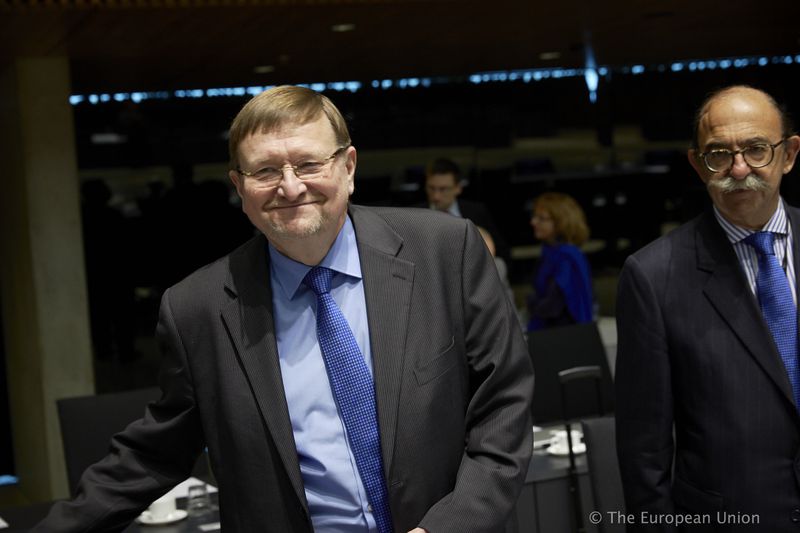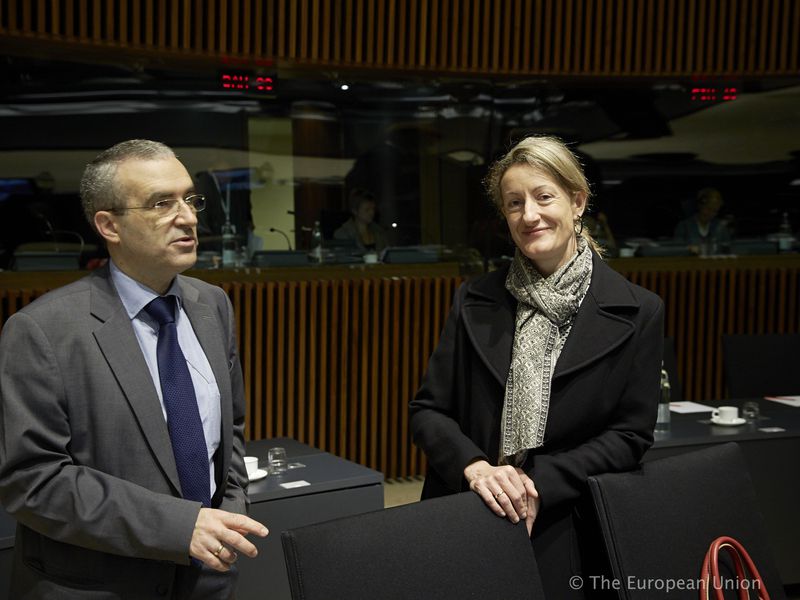A Controversial Start of Discussions on the European Prosecutor's Office
Adelina Marini, October 8, 2013
 Do you remember the SAPARD trial? There is no way that you can forget it because it was a trans-European case of fraud with pre-accession funds for Bulgaria in which the German accomplices got effective prison sentences in Germany, while their Bulgarian partners were fully acquitted in Bulgaria, among whom there was a sponsor of a presidential campaign. The good news are two. One is that the trial will be resumed in the beginning of next year in Bulgaria and it will be returned in the pre-trial phase. The second good news is that the first discussions on the European Commission proposal from July for the creation of a common European Prosecutor's Office have begun. And that institution is meant to deal with precisely such a type of cases - against the EU's financial interests.
Do you remember the SAPARD trial? There is no way that you can forget it because it was a trans-European case of fraud with pre-accession funds for Bulgaria in which the German accomplices got effective prison sentences in Germany, while their Bulgarian partners were fully acquitted in Bulgaria, among whom there was a sponsor of a presidential campaign. The good news are two. One is that the trial will be resumed in the beginning of next year in Bulgaria and it will be returned in the pre-trial phase. The second good news is that the first discussions on the European Commission proposal from July for the creation of a common European Prosecutor's Office have begun. And that institution is meant to deal with precisely such a type of cases - against the EU's financial interests.
According to the proposal, the European Prosecutor's Office (EPO) will be a decentralised European institution with explicit competences to investigate, prosecute and sent to justice the perpetrators and their accomplices in crimes against the Union's financial interests. For the purpose, uniform investigative powers will be created for the entire EU which will be integrated in the national legal systems. The prosecutor's office will consist of a prosecutor, four deputies and delegated prosecutors in the member states. As Vice President Viviane Reding explained, responsible for justice, the delegated prosecutors will be allowed to perform the function of normal prosecutors, if that is possible and depending on the number of fraud cases.
Currently, as the SAPARD trial in Bulgaria shows, practically the EU has no powers to intervene in cases of fraud with EU funds. The investigation and prosecution are entirely realised by national authorities, but research and statistics show that often these investigations fail due to divergence of legal systems and law-enforcement rules in the member states. The share of successfully completed trials varies significantly in the EU - from around 20% to over 90 per cent. The reasons often are the complexity of cases, the lack of sufficient national resources and frequent need to collect evidence beyond national borders, is the assessment of the Commission. And a separate issue, not mentioned in the EU documents about the fight with EU funds fraud, is the inefficiency justice and even political interference in countries that have problems with the rule of law.
Commission calculations show that in the past years had been identified cases of fraud worth 500 million euros, although the actual amount is probably much higher. In spite of the intentions, very telling were the reactions of the representatives of the member states in the Justice and Home Affairs Council on October 7, when the Commission proposal was discussed for the first time.
From "firmly yes" to "let's leave this for later"
One of the member states with highest EU funds absorption - Poland - reacted firmly negatively to the Commission proposal, pointing out that it envisages a transition from a horizontal to a vertical approach, which is "extremely controversial for Poland". The country's position is that the jurisdiction given to the EPO in the Commission proposal is completely unacceptable for Poland. The prosecutor should not decide which cases to be started. It is necessary to clearly define the boundaries of the independence of the work of European prosecutors, is Warsaw's opinion. Hungary, too, said 'no', pointing out that with the establishment of the new body part of the sovereignty will be transferred onto it, which is why it is necessary to see what the consequences of such a thing will be. "This document is still not ripe for adoption", was Hungary's position. It is important the discussions to continue, but there should be no haste with decision, was another frequently repeated remark during the public debate.
 A similar position defended the Czech Republic, according to which additional discussions are needed domestically, especially in the Czech parliament, to ensure support. Sweden, too, did not present a specific position because there is still no unanimity within the four-party government coalition. Nonetheless, the Swedish representative pointed out that it was very important to increase cooperation on legal issues. Germany, for its part, said it was important the national prosecution to have a major role. France, however, emerged as a strong supporter of the establishment of a European prosecutor's office pointing out that it should be present in every national system.
A similar position defended the Czech Republic, according to which additional discussions are needed domestically, especially in the Czech parliament, to ensure support. Sweden, too, did not present a specific position because there is still no unanimity within the four-party government coalition. Nonetheless, the Swedish representative pointed out that it was very important to increase cooperation on legal issues. Germany, for its part, said it was important the national prosecution to have a major role. France, however, emerged as a strong supporter of the establishment of a European prosecutor's office pointing out that it should be present in every national system.
Luxembourg was among the most determined supporters pointing out that this was a decisive stage for "our common judicial area because we have to deal with this kind of crimes in all member states". The only appropriate response is a common European institution. After all, the main idea behind it is to be independent from the member states, said the representative of Luxembourg. For Malta the issue is highly sensitive, especially because of the divergences in the legal order of the member states. Similar concern expressed Slovenia, too, which stated that the prosecution in the country cannot be demanded to act. It can only provide general guidance.
And for Estonia the most important thing was to avoid additional costs for the member states or the European budget from the creation of the new structure. Romania expressed an agreement in principle, but demanded additional discussions at technical level, while Portugal, same as Luxembourg, said that the time had come to create a European prosecution. Belgium even pointed out that things should go much farther than the Commission proposal. We support it not 100%, but 500 per cent, said the Belgian representative. Croatia's Justice Minster Orsat Miljenic used the same expression, saying that Croatia was 100% behind the idea, but Zagreb supported more the horizontal approach rather then the vertical one. Croatia also demanded a list of the specific competences of the new authority.
Bulgaria's Justice Minister Zinaida Zlatanova was also among the strongest supporters of the proposal, saying that Bulgaria would support the establishment of a stronger EPO with explicit  competences for indictment and prosecution.
competences for indictment and prosecution.
The establishment of the office is envisaged in the Lisbon Treaty under Article 86. In order for it to be approved, though, it should be adopted by the Council by unanimity and then the consent of the European Parliament to be secured. If there is no unanimity in the Council, then the procedure of enhanced cooperation can be used, which means the office to be established only by some member states, but no less than nine. The fears of such a development were visible during the debate on Monday at noon, when several ministers called for a maximum number of countries to accept the EPO, among whom was Minister Zlatanova. Germany pointed out that everything necessary should be done to reach the broadest possible consent among the member states. For this called also Finland and Latvia.
Denmark, for its part, pointed out that this would be an extremely expensive undertaking, although the country already announced it would not take part in the EPO, as well as UK. It is still not clear what will Ireland decide, which has not revealed its position yet. Viviane Reding, however, was impressed with the large number of countries that gave a positive assessment, Moreover, she said this was a breakthrough which the Council Presidency (Lithuania) should be proud of. However, this is not about pride, but about protection of the taxpayers' money and also about the fact that business works smoothly trans-nationally, but, alas, justice still is purely national which leaves gaps skilfully used by businessmen like the participants in the SAPARD affair in Bulgaria.
 Federica Mogherini | © Council of the EU
Federica Mogherini | © Council of the EU | © Council of the EU
| © Council of the EU Luis De Guindos | © Council of the EU
Luis De Guindos | © Council of the EU